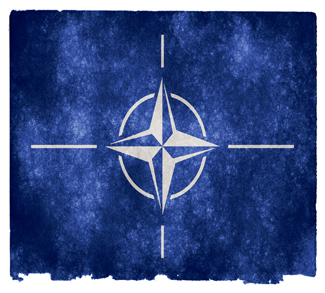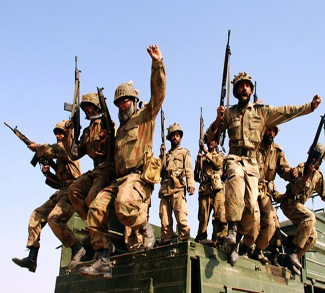FORECAST
On Friday, Pakistan redeployed thousands of troops to its border with India, making war imminent between the nuclear-armed rivals following last month’s terrorist attacks on Mumbai, India’s cultural and financial capital.
The Pakistani move comes in response to last week’s incursion into Pakistan’s airspace by two team’s of Indian Air Force (IAF) jet fighters in an attempt to test Pakistan’s air defences, response time and in order to expose the location of radar stations along the border. In turn, the Pakistani Air Force (PAF) has increased its own vigilance by scrambling fighter jets over several Pakistani cities in order to defend against an Indian air attack.
Meanwhile, in preparation for an increasingly likely fourth Indo-Pak war, Indian Prime Minister Manmohan Singh assembled India’s military chiefs in New Delhi to review the “preparedness” of the Indian armed forces. Additionally, India’s Foreign Ministry has advised its citizens to avoid travel to Pakistan – a direct indication that Indians in Pakistan may soon become unsafe in the country India is about to wage war against.
Manmohan Singh’s Pakistani counterpart, President Asif Ali Zardari, has similarly convened meetings with his armed forces chiefs, including the head of the Pakistani Chief of Army Staff, Ashfaq Parvez Kayani, who has publicly iterated Pakistan’s preparedness to retaliate within minutes against any Indian strike.
In fact, officials from both countries have publicly declared their preference for restraint, but both have forcefully reiterated their mutual commitments to respond in kind if attacked by the other.
Nonetheless, calls for retaliation and response continue to echo across the political spectrum in both countries, a response to the ultra-nationalist views shared by strong majorities on both sides of the border. Recently, influential Hindu nationalist leader Bal Thackeray, founder and chief of the Hindu supremacist Shiv Shena (“Army of God”), began rallying for the Indian government to cease threatening Pakistan and commence attacking it. Similar sentiments have been expressed in Pakistan by Islamic nationalists, including militants allied with the Taliban and al-Qaeda.
The Taliban, al-Qaeda and other anti-American allied militant groups operating in Pakistan, particularly in the NorthWest Frontier Province (NWFP) and the Federally Administered Tribal Areas (FATA) have vowed to cease operations against the Pakistani government and join the Pakistani Army in waging war against India, including utilizing suicide bombers.
The recent Pakistani troop movements to the Indo-Pak border is a major victory for these anti-American forces operating along the AfPak border, as it relieves their positions and allows for greater freedom in conducting operations against NATO supply convoys along the vulnerable supply routes through the mountainous border regions.
As the march to war continues with increasing momentum, there may be little either governing party can do but accede to its citizens desire for war: in India, the ruling Congress Party will most surely lose next year’s general elections to the Hindu nationalist parties unless it responds to the Mumbai terrorist attacks rapidly and robustly; meanwhile, in Pakistan, Zardari, of his late wife Benazir Bhutto’s Pakistan People’s Party (PPP), faces national collapse or another military coup if he is seen as weak or indecisive in the face of an Indian attack.
War, small or large, seems imminent at this stage.
Perhaps that is why recent reports out of New Delhi indicate that India is attempting to buy 510 advanced CBU-105 cluster bombs from the U.S. for $375 million, despite the fact that the UN launched a drive to outlaw such WMDs on December 3rd through the Convention on Cluster Munitions (CCM). Interestingly, India and Pakistan joined the U.S., Israel, Russia and China in refusing to attend the talks on the ban.
It should be noted that cluster bombs are designed for maximum civilian death – should India drop cluster bombs during surgical strikes against Pakistani targets, including militant training camps, the civilian death toll caused by such WMDs would be so great that a fourth Indo-Pak War between the nuclear rivals would be utterly inevitable.
SUMMARY OF EVENTS:December 22 – 29, 2008
NORTH AMERICA
Mexico
Mexico arrested a military officer suspected of passing information to drug traffickers as part of a government sweep to rout out corruption, the attorney general’s office said in a statement on Friday.
United States
After receiving billions in aid from U.S. taxpayers, the nation’s largest banks say they can’t track exactly how they’re spending the money or they simply refuse to discuss it.
The Republican consultant accused of involvement in alleged vote-rigging in Ohio in 2004 was warned that his plane might be sabotaged before his death in a crash Friday night, according to a Cleveland CBS affiliate.
Vice President Dick Cheney, according to a still-highly confidential FBI report, admitted to federal investigators that he rewrote talking points for the press in July 2003 that made it much more likely that the role of then-covert CIA-officer Valerie Plame in sending her husband on a CIA-sponsored mission to Africa would come to light.
The press office at the U.S. embassy in Russia dismissed Russian claims on Wednesday that American mercenaries fought alongside Georgian troops in August during the military conflict in South Ossetia.
The terrorism threat to the United States over the next five years will be driven by instability in the Middle East and Africa, persistent challenges to border security and increasing Internet savvy, says a new intelligence assessment obtained by The Associated Press.
EASTERN EUROPE
Georgia
Georgia and the United States will sign a strategic partnership agreement in Washington on January 4, Georgia’s foreign minister said on Thursday.
The European Union Monitoring Mission (EUMM) said on Friday it was concerned over the deployment by Georgia of Cobra armored vehicles in areas close to the South Ossetian and Abkhazian borders.
Russia
Russia is not selling S-300 surface-to-air missile systems to Iran, the Russian federal service for military cooperation said in a statement on Monday.
The Russian military will commission more than 70 strategic nuclear missiles in the next three years, Interfax news agency quoted the deputy head of the military-industrial committee as saying Monday.
Russia’s foreign minister accused the United States on Tuesday of reneging on a promise not to allow Georgia membership in NATO if it ventured to attack breakaway South Ossetia.
Russian-Cuban relations will serve as the starting point to advance Russia’s interests in the entire Latin American region, a Russian diplomat said on Friday in an interview with RIA Novosti.
Ukraine
Ukrainian President Viktor Yushchenko plans to declare a state of emergency in the country and cancel all elections, the country’s prime minister said on Wednesday.
MIDDLE EAST
Israel
It was reported Sunday that Israeli Foreign Minister Tzipi Livni has instructed diplomats across the globe to launch what is being described as a “PR blitz” to shore up international support for an Israeli invasion of the Gaza Strip.
Israel moved closer to invading Gaza, saying Thursday it had wrapped up preparations for a broad offensive after Palestinian militants fired about 100 rockets and mortar shells across the border in two days.
West Bank
An Israeli air strike killed a Hamas gunman in the Gaza Strip after Palestinian militants fired dozens of rockets and mortars into southern Israel on Wednesday, dampening prospects for a renewed ceasefire.
The spectre of a military invasion on Friday hung over the Hamas-run Gaza Strip where two children were killed as Palestinian militants fired more rockets despite Israeli threats of harsh retaliation.
EAST ASIA
China
Chinese warships headed toward Somali waters Friday to combat piracy, the first time the communist country has sent ships on a mission that could involve fighting so far beyond its territorial waters.
SOUTH ASIA
India
India has given no information about last month’s attacks in Mumbai to Interpol and information passed to media by Indian investigators should be shared if it is accurate, the police agency’s chief said on Tuesday.
Pakistan
Pakistan’s media has reported Monday that the country’s military is on high alert over a possible attack by India.
Pakistan troops were deployed on Thursday to protect vital points along the Line of Control in Kashmir and the international border with India, defence sources told Daily Times.
AFRICA
Guinea
Guinea faced political turmoil Tuesday after the death of veteran President Lansana Conte opened a power vacuum and triggered a coup attempt by mutinous soldiers.
Thousands of Guineans on Wednesday cheered a young army captain chosen as de facto head of state by the military junta that took over the West African country in a coup after the death of President Lansana Conte.
Guinea’s new military rulers were endorsed by the deposed prime minister on Thursday, but condemned by the United States which demanded an immediate return to civilian rule.
Zimbabwe
A Zimbabwean High Court judge ordered the immediate release on Wednesday of local human rights campaigner Jestina Mukoko and nine other activists charged with plotting to overthrow President Robert Mugabe’s government.
Manjit Singh is a contributor to Geopoliticalmonitor.com



